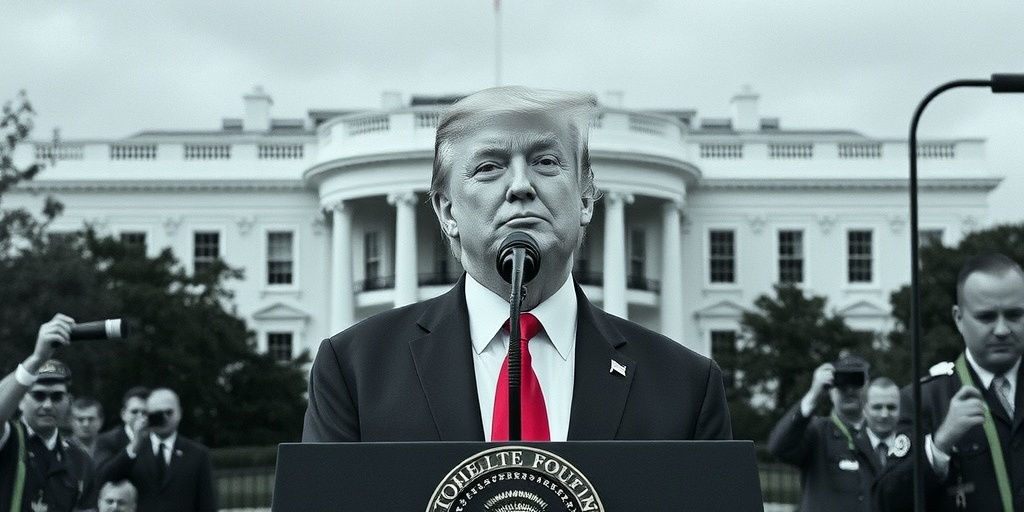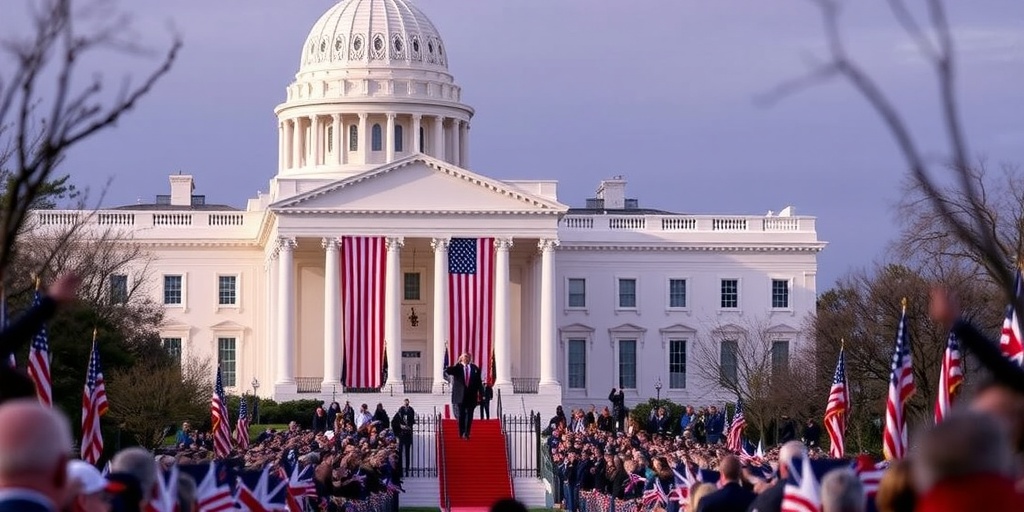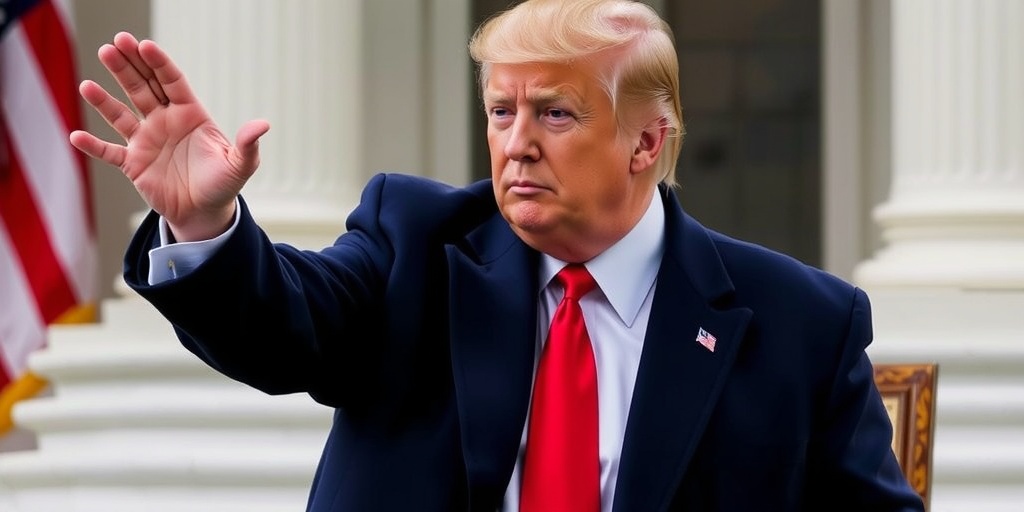Now Reading: Trump’s Shift: From Supporting Neighbors to Hurting Them
-
01
Trump’s Shift: From Supporting Neighbors to Hurting Them
Trump’s Shift: From Supporting Neighbors to Hurting Them

Trade Tensions Rise as U.S. Imposes Tariffs on Canada and Mexico
In a surprising turn of events, President Trump announced the imposition of a 25 percent tariff on approximately $1 trillion worth of imports from Canada and Mexico, dismantling over three decades of economic integration established by the North American Free Trade Agreement (NAFTA). The president’s abrupt decision has stirred concerns regarding the impact on North America’s economies, with fears that the tariffs could lead to recessions in both neighboring countries.
Trump’s tariffs threaten not only to raise costs for Canadian and Mexican goods, but they also pose a significant risk to U.S. manufacturers and consumers who have come to rely on a smooth flow of raw materials from these trade partners. Edward Alden, a senior fellow at the Council on Foreign Relations, characterized this move as a shift from viewing trade as a mutual benefit to utilizing it as a weapon of economic warfare. He warned that such tariffs compromise the economic well-being of the U.S.’s closest neighbors.
During his address to Congress, Trump downplayed the potential disruptions, claiming that the tariffs are aimed at making America "rich again" and ensuring the protection of American jobs. However, economists have flagged the tariffs as potentially damaging to the economies of Canada and Mexico, which rely heavily on trade with the U.S. While trade constitutes approximately 25 percent of U.S. economic activity, it accounts for around 70 percent of Mexico’s and Canada’s economic activity. This heavy dependence means that any decrease in exports to the U.S. could lead to serious repercussions.
Tony Stillo, an economist from Oxford Economics, predicted that the Canadian economy could head into recession due to these tariffs, with inflation rates surging and unemployment potentially exceeding 8 percent. Mexico might experience a similar fate, with estimates suggesting a two percentage point reduction in economic growth. Already, some U.S. companies are reconsidering their production strategies as they prepare for tariffs that could reshape the North American manufacturing landscape.
Randy Carr, CEO of World Emblem, noted that the tariff threat compelled his company to explore opening a new factory in the Dominican Republic. While he did mention a willingness to bring jobs back to the U.S. if tariffs remained in place, he emphasized it would substantially increase product costs and necessitate a reevaluation of expansion plans.
The tariffs are poised to adversely affect American industries that depend on resources imported from Canada and Mexico, pushing up costs and likely forcing some businesses to close their doors amid shrinking profit margins. Analysts at S&P Global Ratings projected that the tariffs could decrease U.S. GDP by roughly 0.6 percent over the next year while causing Canadian and Mexican GDP to drop by 2 to 3 percent.
Despite the potential economic fallout, major U.S. automakers expressed gratitude for a one-month reprieve from tariffs, acknowledging the financial burden that such levies would impose. During discussions, automakers warned that the tariffs could wipe out all profits by incurring billions in new costs.
With the imposition of tariffs, trust between the U.S. and its neighbors has been severely tested. Canada has responded to U.S. requests by tightening visa regulations and enhancing border security, while Mexico has increased military presence to combat drug cartels, including handing over cartel operatives to U.S. authorities. Nonetheless, these diplomatic gestures have not mitigated the tensions stemming from tariff threats.
Canadian Prime Minister Justin Trudeau rebuked the justification for the tariffs, labeling it as “completely bogus and unjustified.” He suggested that such measures might suggest a hidden agenda to collapse the Canadian economy, a prospect he firmly believes would result in negative repercussions for the U.S. as well. “A fight with Canada will have no winners,” Trudeau remarked.
While some groups, like the United Auto Workers, have supported tariffs due to long-standing grievances against trade agreements like NAFTA, many industries have warned that such actions could backfire on the U.S. economy by damaging American manufacturing and costing jobs.
The National Council of Textile Organizations indicated that the tariffs would ultimately benefit rival nations such as China rather than strengthen the U.S. textile industry, which has been struggling with significant production losses in recent years.
The broader implications of these tariffs echo the divisive debates that surrounded NAFTA during its inception in the 1990s. Proponents argued that it would stimulate investment and economic growth in Mexico while discouraging illegal immigration, but critics contended it would devastate U.S. manufacturing jobs. Studies have shown that while NAFTA expanded the U.S. economy, it left significant pain and dislocation in its wake, particularly for blue-collar workers.
The irony of the current situation is not lost on economists, who warn that Trump’s aggressive trade policies could induce the same kind of economic upheaval that initially provoked outrage. As trade tensions escalate, the focus now shifts to the long-term ramifications for all parties involved in this precarious economic landscape.
Stay Informed With the Latest & Most Important News
Previous Post
Next Post
-
 01New technology breakthrough has everyone talking right now
01New technology breakthrough has everyone talking right now -
 02Unbelievable life hack everyone needs to try today
02Unbelievable life hack everyone needs to try today -
 03Fascinating discovery found buried deep beneath the ocean
03Fascinating discovery found buried deep beneath the ocean -
 04Man invents genius device that solves everyday problems
04Man invents genius device that solves everyday problems -
 05Shocking discovery that changes what we know forever
05Shocking discovery that changes what we know forever -
 06Internet goes wild over celebrity’s unexpected fashion choice
06Internet goes wild over celebrity’s unexpected fashion choice -
 07Rare animal sighting stuns scientists and wildlife lovers
07Rare animal sighting stuns scientists and wildlife lovers




















